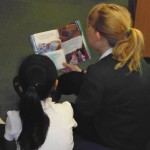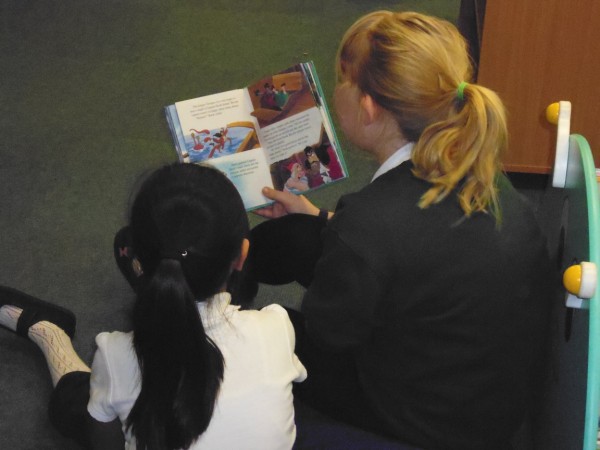 Following a review of the curriculum for 3-18 year olds all schools in Scotland now deliver Curriculum for Excellence.
Following a review of the curriculum for 3-18 year olds all schools in Scotland now deliver Curriculum for Excellence.
At Cults Primary we recognise that the more actively involved children are in their own learning and in setting their own targets, the more they achieve and enjoy their time in school.
Curriculum for Excellence aims to provide all pupils in Scotland the opportunity to develop the following 4 capacities:
-
-
-
-
-
-
- Successful learners
- Confident individuals
- Responsible citizens
- Effective contributors
-
-
-
-
-
Literacy And English Language
When your child first begins at Cults Primary they will be assessed to gain an understanding of their needs. This helps ensure that your child is appropriately challenged and continues to make good progress. Language work incorporates reading, writing, listening and talking.
There is a strong focus on teaching reading as we recognise that children who are skilled readers very quickly develop excellent writing skills too. We have a wide range of reading materials and teachers make use of the reading scheme best suited to the child’s needs at any given time. Children who require additional support or challenge in reading are given support from the SFL teacher where possible. Your support is invaluable and we will share with you how to support your child in their reading at home as part of the induction process.
Early letter formation and simple spelling is taught making use of a synthetic phonics approach. The children really enjoy this active approach to learning and generally make good progress.
Children are asked to evaluate their own progress in writing tasks and are beginning to set their own targets so that they are focused on their next steps in learning. This self-evaluation begins in Nursery and is gradually developed so that the children have a clear understanding of what they need to work on.
The collaborative nature of this approach provides many opportunities for the children to learn new skills and become confident listeners and talkers. The vast majority of listening and talking tasks involve the children working in other curricular areas, indeed the curriculum is now very rarely taught in discrete subjects.
Modern Languages
At Cults Primary children learn French. There is a mix of written and spoken language, however much of the teaching is delivered through games and activities.
Continuous assessment is integral to teaching at Cults Primary and ensures that the children are receiving an appropriate challenge.
Social Studies, Science And Technology
This area is being reviewed in light of Curriculum for Excellence. The children are encouraged to be actively involved in planning their own learning and we are increasingly building pupil voice and choice into our approach.
ICT
The children follow a planned curriculum to help them develop basic skills, but also make use of IT in all areas of the curriculum. We have Smartboard interactive whiteboards, mobile devices, including ipads and Chromebooks, which we use alongside our existing PCs and laptops as we develop and expand our use of technology across the school.
Religious and Moral Education
All children are given opportunities to develop their understanding of Christianity and other world religions. We believe this is important to help create a tolerant society. Representatives from local churches as well as representatives from other groups may talk to the children at assembly or in class, depending on topics being studied. If you have any particular questions or requests regarding the teaching or RME, or would be happy to come into school and discuss your faith with a group of children, please contact the Head Teacher.
Expressive Arts
Our pupils are encouraged to be creative. We make use of a range of resources to support the children and also give them the opportunity to use these skills in a variety of ways.
This curricular area is organised under the following headings:
- Participation in performances and presentations
- Art and design
- Dance
- Drama
- Music
We regularly invite travelling production companies into school and encourage classes to visit local theatres, museums and festivals to gain as broad an education as possible.
Health and Wellbeing
Health and wellbeing is a priority area for the Scottish Government. The following wellbeing indicators illustrate the basic requirements identified for all children and young people to develop and grow so they can achieve their full potential:
-
- Safe
- Healthy
- Achieving
- Nurtured
- Active
- Respected
- Responsible
- Included
Learning in health and wellbeing ensures that children and young people develop the knowledge and understanding, skills, capabilities and attributes which they need for mental, emotional, social and physical wellbeing now and in the future. Staff at different stages plan lessons to ensure pupils receive age appropriate information about sensitive areas; such as awareness of substance misuse, and also to promote relationship education, which includes looking at sexual health. If your child’s class will be covering sensitive issues you will be invited to come into school and view materials that will be used and to ask any questions to ensure that you are comfortable with all aspects of your child’s education.
Mathematics and Numeracy
We have recently purchased a large quantity of mathematics resources so that our pupils can practise new skills in real situations and have fun at the same time. The children learn about many aspects of mathematics, the broad headings being:
- Estimating and rounding
- Number and number processes
- Multiples, factors and primes
- Powers and roots
- Measurement
- Mathematics – its impact
- Patterns and relationships
- Expressions and equations
The children make use of a vast selection of interesting resources in mathematics. Teachers vary the approach as often as possible to keep the children engaged and motivated.
Further information of Curriculum for Excellence is available on the school website where you can find information of which areas will be covered over the year and on the Education Scotland site.
Children at all stages have the opportunity to develop skills for life, future learning and work through a range of enterprise activities that support our pupils to apply their learning in a range of different contexts.

